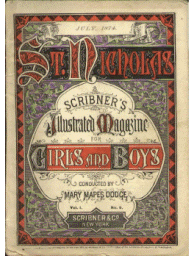St. Nicholas and Poetry
Listen to the Recess! Clip
| Author | Rita Smith |
| Air Date | 4/13/2004 |

St. Nicholas and Poetry Transcript
In 1899, the editors of St. Nicholas Magazine for Boys and Girls established monthly competitions in various arts, including poetry. The winning entries were published in the magazine, in a column called “The St. Nicholas League.” Each monthly competition had a theme. The poem which readers could submit for the September, 1901, issue had to contain the word “harvest” or “harvesters.” The rules were that the young reader had to have written it himself and it couldn’t be more than 24 lines in length. A young 15 year old named William R. Benet won the silver medal for his poem entitled “The Harvest.”
Yon lie the fields all golden with grain,
(Oh, come, ye Harvesters, reap!)
The dead leaves are falling with autumn’s brown stain.
(Oh, come, ye Harvesters, reap!)
For soon sinks the sun to his bed in the west,
And cawing the crows fly each one to his nest;
The grain soon will wither, so harvest your best.
(Oh, come, ye Harvesters, reap!)
Swift sweep the scythes o’er the mellowing ears,
(Reap on, ye Harvesters, reap!)
And soft falls the grain like a fond mother’s tears.
(Reap on, ye Harvesters, reap!)
The sun sinketh down, and the day’s work is done,
And slow go the harvesters home one by one.
Night now is at hand, but the harvest’s begun.
(Reap on, ye Harvesters, reap!)1
Rather formal and sentimental, but not a bad poetic effort for a fifteen year old boy. William Rose Benet, went on to Yale and became editor of the Yale Record. After graduation he worked for a variety of periodicals and in 1924 he helped establish The Saturday Review of Literature which he continued to edit and write for until his death in 1950. He edited several poetry anthologies, including a comprehensive collection of Mother Goose rhymes published in 1938 and illustrated by Roger Duvoisin and wrote numerous books of original poetry. Benet’s poetry was sometimes criticized for its melodrama, but it continued to earn respect, and in 1942 he received the Pulitzer Prize for The Dust Which Is God, a collection of optimistic autobiographical poems with a patriotic emphasis.
When they launched the St. Nicholas League, the editors hoped that the competition between young writers and seeing their work in print would help some of its members develop from talented boys and girls into young men and women whose work would “find a worthy place amid the achievements of the great world outside the magazine.”2 William Rose Benet is one of those young readers whose work did find such a place.
Notes
1 St. Nicholas Magazine, Volume XXVIII, part II, p. 1406. 2 Ibid, p. 850.
Sources:
Contemporary Authors Online, Gale, 2004. Reproduced in “Biography Resource Center”. Farmington Hills, Mich.: The Gale Group. 2004. http://galenet.galegroup.com
St. Nicholas Magazine, The Century Company, Vol. XXVIII, part II, 1901.